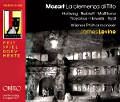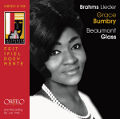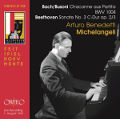
NEW RELEASES
NEW RELEASES of the last 12 months
COMING SOON
ARCHIVE
AWARDS
CDs
SACDs
LPs
MCs
CATALOGUE NUMBERS
|
|
ORFEO International – Reviews
Important Releases Briefly Introduced
September 2017
Salzburger Festspieldokumente 2017
The more time passes, the longer becomes the period for which music recordings exist. The Salzburg Festival, established in 1920, was quick to exploit the new medium of radio – ‘the history of the Festival is the history of radio’ as the music journalist Gottfried Kraus wrote. As early as 1925 a complete Don Giovanni (under Karl Muck) was broadcast, with ever more performances to more countries in the years that followed, while the first physical sound recording, on shellac, appeared in 1931 (Mozart’s Requiem, Orfeo C 396951). In 1992 the Salzburg Festival decided, in conjunction with the Austrian broadcaster ORF, to issue especially valuable and historically relevant recordings from the archives as ‘Salzburger Festspieldokumente’. ORFEO is proud to have made a lasting contribution to the project, being the only organization involved that can supply all of the published titles – true to its philosophy. For an institution like the Salzburg Festival, with its aspiration to present much of what’s best in the concert and opera world today, lasting documentation of historical recordings adds an exciting dimension to the artistic perspective. Given the radical changes in the music business and performance practice over the last few decades, the opportunity to consider upheavals from earlier times leads to stimulating reflections in all sorts of directions.

C 938 172 I
C 939 171 B
C 941 171 B
C 942 171 B
C 943 171 B
And so it’s exceptionally interesting to hear now, for the first time, Daniel Barenboim at the age of 27 making his solo debut with an all-Beethoven programme, as Barenboim is today so esteemed and authoritative a figure in so many genres and forms of classical music and, now a mere 74, is heir to older traditions with greater historical depth than any of his contemporaries. At the time Barenboim had only just begun to unfold as a musical all-rounder and was at the zenith of a career that hitherto had concentrated on the piano. In the context of marked divergences between successive generations, common in the music world at that time, Barenboim asserts himself confidently and brilliantly, with remarkable pianistic eloquence and above all an array of musical virtues: the ability to generate tension and great contemplative depth, a highly imaginative conception, a very wide dynamic range and an amazing songfulness which has lost none of its power to captivate – as in the breathtaking slow movement of op. 10 No. 3, in a Waldstein Sonata with a daringly opened-up final movement as well as in an op. 111 with passages of heavenly length in the Arietta.
Five years earlier the legendary Arturo Benedetti Michelangeli, then 45, made his first and last appearance at the festival. Just how exceptional the appearance of this reclusive artist was can be seen in the fact that he strictly and successfully forbade the recording and broadcast of the second half of the concert. It is uniquely appropriate that one of the few Bach pieces from his publicly performed repertoire should be the Bach Chaconne for Violin – an instrument that Benedetti Michelangeli had himself studied and that he said he sought to imitate with his own highly sophisticated piano technique. The work is heard here in the transcription by Ferruccio Busoni. It’s intriguing once again how different the meticulously thought-out interpretations of his very limited public repertoire are, and striking how forcefully and not at all reservedly the Maestro sometimes permitted himself to play. The technically dazzling Beethoven Sonata op. 2 No. 3 is performed here with a perfection and at the same time a gutsy virtuosity that is quite disarming.
One of the great and fascinating singers of her day was the “black Venus” of Bayreuth, Grace Bumbry, who demonstrated her exceptionally wide range at the Salzburg Festival with a gripping Lady Macbeth by the Wagner antipode Verdi (Orfeo C 843112) as well as with the impressive Lieder recital on this recording, exclusively devoted to the Wagner antipode Brahms – from an age that was more friendly towards Lieder recitals than today, yet still one full decade before Jessye Norman.
A genuinely great instrumentalist who certainly left his mark on the music world was cellist Heinrich Schiff, who died last year and is not adequately represented on CD. He can be heard here in his full-on vigorous musicality with a partner who is unusually his equal, in three major works of the cello repertoire, the Sonata op. 40 by Shostakovich, the middle sonata by Beethoven and the last one by Brahms.
Another monumental musician of our time is without doubt the very great opera conductor James Levine. On this recording he can be heard at the age of 34 in a Ponnelle production of Mozart’s last opera La clemenza di Tito – which fits nicely with this year’s programme – in what was an exciting time of upheaval: just before the epoch-making change in musical practice we associate with the name Harnoncourt and which began coincidentally with Mozart’s other ‘opera seria’ Idomeneo. Here ‘Jimmy’ Levine delivers an energetic, ‘full’ and astute performance, not least thanks to a superbly well-suited ensemble of singers and a Vienna Philharmonic in excellent form: a reading so convincing and overwhelming that we realize with astonishment once again that prior to the supposed ‘salvation’ and ‘rediscovery’ there were indeed very, very good performances of works still considered challenging today.
top |
|

ORFEO
Chormusik & Oratorien
Edition zeitgenössisches Lied
Kammermusik
Lied
Musica Rediviva
Oper
Recital
Symphonie & Konzert
Weihnachten
ORFEO D'OR
Bayerische Staatsoper live
Bayreuther Festspiele live
Deutsche Oper am Rhein
Salzburger Festspieldokumente
Wiener Staatsoper live
Wiener Symphoniker
Dirigenten
Große Sänger d. 20. Jh.
Orchesterkonzerte
Quartette
Solisten
|